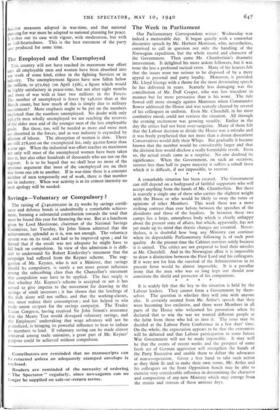Savings—Voluntary or Compulsory ?
The raising of £140,000,000 in 23 weeks by savings certifi- cates and defence bonds is undoubtedly a remarkable achieve- ment, forming a substantial contribution towards the total that must be found this year for financing the war. But at a luncheon given by Lord Mottistone, chairman of the National Savings Committee, last Tuesday, Sir John Simon admitted that the achievement, splendid as it is, was not enough. The voluntaq system was on its trial, and had to be improved upon ; and he hinted that if the result was not adequate he might have to fall back on compulsion. In view of this admission it is diffi- cult to understand Sir Robert Kindersley's statement that the campaign had suffered from the Keynes scheme. The sug- gestion of Mr. Keynes, who is not a Minister, that savings should be compulsory, is surely a not more potent influence among the subscribing class than the Chancellor's statement that compulsion may have to be applied. The fact surcly is that whether Mr. Keynes's scheme is accepted or not it has served to give impetus to the movement for drawing in the savings of small investors ; it has shown that the lendings of the rich alone will not suffice, and that the working-classes, too, must reduce their consumption ; and has helped to win trade union support for the savings campaign. The Trades Union Congress, having received Sir John Simon's assurance that the Means Test would disregard voluntary savings, and the Employers' undertaking that wage advances will not be prejudiced, is bringing its powerful influence to bear to induce its members to lend. If voluntary saving can be made almost universal among trade unionists, a great part of Mr. Keynes' purpose could be achieved without compulsion.






























 Previous page
Previous page